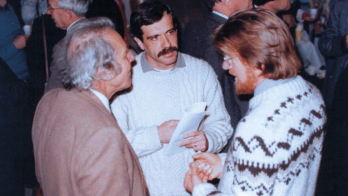translated into English by Giovanni Bignami, Moon Books Limited 2000. Information and orders via http://www.galileounaluna.com/

It is with pity and anguish that I see Students and seekers of the Greatest Good Fail yet again to strike where it may be So begins an epic verse penned in 1590 in Pisa, not by poet Francesco Berni, who defined the rhythmic style of the poem, nor by Pisa’s Cardinal Antonio Pozzi, but by his contemporary, Galileo Galilei. To those familiar only with Galileo’s scientific work, the fact that he also composed poetry might come as something of a revelation. That he should begin by talking of the greatest good even more so. Yet the subject-matter of this work was close to the young scientist’s heart, as soon becomes apparent in Giovanni Bignami’s wonderful English translation.
Bignami, head of science at the Italian Space Agency, is a master of modern English. With this work he has gone one step further by translating the poem into the English of Shakespeare, and Berni’s rhythmic form into iambic pentameter. Moreover, as Bignami himself points out, the challenge of translating poetry from a language with 7 vowel sounds to one with 52 was daunting in its own right. But Bignami has succeeded spectacularly. The translation reads with fluid clarity, and the humour is as intact as can be expected after its journey through time and language.
It is a few pages in that we begin to learn what stirred Galileo to put pen to paper: I now conclude, and turn to you, signor, And force you to confess, against your will, The Greatest Good will be all clothes to abhor
As a young lecturer in Pisa, Galileo railed against a system in which he was obliged to wear his academic gown at all times, on pain of heavy fines, and this poem is his response. His technique is to take the very idea of wearing – or rather not wearing – clothes to its logical conclusion and to propose, tongue firmly planted in cheek, that we do as the beasts do and go naked.
Hilarious and profoundly irreverent consequences rapidly ensue as Galileo examines, for example, the potential repercussions for matchmaking and marriage.
Moon Books of Milan has given the translation a fitting treatment by producing a volume using the materials and techniques of the time. It is rare to find a book of such beauty as the company’s calf-bound limited edition printed on hand-made paper and lavishly illustrated with original drawings by Donata Almici. It is even rarer to find such a treat in store on opening the cover, and it would be a great shame if Prof. Bignami’s efforts, and indeed those of Galileo, were limited to the 2000 copies produced by Moon Books. Prof. Bignami is seeking a mainstream publisher to produce a more affordable edition. Here’s hoping that he succeeds.








